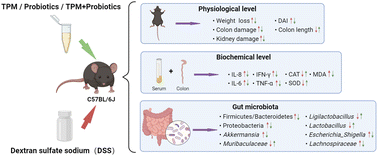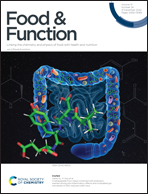A tetrapeptide from maize combined with probiotics exerted strong anti-inflammatory effects and modulated gut microbiota in DSS-induced colitis mice†
Abstract
Ulcerative colitis (UC) is a chronic inflammatory bowel disease characterized by recurrent gastrointestinal inflammation caused by abnormal immune response, and patients usually have intestinal flora imbalance. At present, the pathogenesis of UC is not well understood, and it appears that there is chronic activation of the immune and inflammatory cascade in genetically susceptible individuals. Some food supplements such as specific peptides and probiotics have been investigated and shown the potential for the treatment of UC. The purpose of this study is to investigate the therapeutic effect and potential mechanism of tetrapeptide from maize (TPM) and probiotic treatment on dextran sulfate sodium (DSS)-induced UC in C57BL/6J mice. Our results indicated that the therapeutic effects of TPM and probiotics are positively associated with a reduction in pro-inflammatory cytokine levels and restoration of the gut microbiota. Treatment with TPM or probiotics effectively alleviated the adverse effects of UC, including weight loss, shortened colon length, and colon and kidney tissue damage in mice. Additionally, both TPM and probiotics significantly reduced pro-inflammatory cytokine levels and oxidative stress in UC mice, and the effect was more pronounced when both were used together. Moreover, co-treatment with TPM and probiotics increased the diversity of gut microbes in UC mice, reduced the ratio of Firmicutes to Bacteroidetes (F/B) and increased the abundance of bacterial species, including Muribaculaceae, Alistipes, Ligilactobacillus and Lactobacillus, and has been shown to be beneficial for a variety of pathological conditions.



 Please wait while we load your content...
Please wait while we load your content...